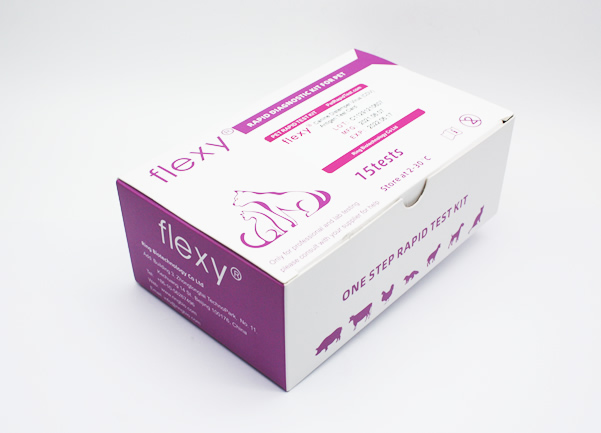
Feline infectious peritonitis Real-time PCR test, FIPV RT-PCR Test is to detect infectious peritonitis virus in cat ascites. which is rapid, accurate and easy-to-operate. Sensitivity 100%, Specificity 100%.
Basic information
Feline infectious peritonitis (FIP) is a lethal systemic disease caused by FIP virus (FIPV), a virulent mutant of apathogenic feline enteric coronavirus (FECV).. Most strains of feline coronavirus are found in the gastrointestinal tract and do not cause significant disease.
Key facts of the Feline infectious peritonitis Real-time PCR test
- Ready to use kits for the vet clinic
- No extraction required
- Result in 30min.
Feline infectious peritonitis Real-time PCR test Components
| Item # | Item | Qty |
|---|---|---|
| 1 | PCR reaction solution | 120ul |
| 2 | Negative Control | 50ul |
| 3 | Positive Control | 50ul |
| 4 | Exogenous Gene Control | 50ul |
| 5 | Sample buffer | 1ml |
| 6 | Enzyme mix | 10ul |
| 7 | Kit user manual | 1set |
What is feline infectious peritonitis?
Feline infectious peritonitis (FIP) is an important disease of domestic cats. It occurs worldwide in cats of all ages, but the disease is most common in young cats less than two years of age. Although FIP is not a particularly common disease, it is important because once a cat develops the disease, the outcome is almost invariably fatal.
What is the cause of FIP?
FIP is associated with a viral infection called feline coronavirus. There are many different strains of feline coronavirus, which differ in their ability to cause disease. Previously there had been an attempt to classify these strains as either feline infectious peritonitis virus strains (capable of causing the FIP disease) or feline enteric coronavirus strains (essentially harmless strains mainly found in the intestinal tract). It is now recognized that feline enteric coronavirus strains can mutate (change) to the more harmful type of virus and cause FIP disease.
What clinical signs does a cat infected with FIP develop?
In cats that develop FIP disease, the first signs of illness may be very vague. Listlessness, lethargy, decreased or absent appetite, weight loss, and a fluctuating fever are commonly reported clinical signs. After a period of several days to a few weeks other symptoms typically begin to occur.
How is FIP diagnosed?
More recently, a technology called polymerase chain reaction (PCR) has been used to detect viral genetic material in tissue or body fluid. Although these tests can be useful, none of them is 100% accurate, and each suffers from its own limitations that may lead to false-negative or false-positive results.
Extended reading
- Feline infectious peritonitis, VCA hospitals
- Feline infectious peritonitis, Cornell University, Baker Institute for Animal Health




